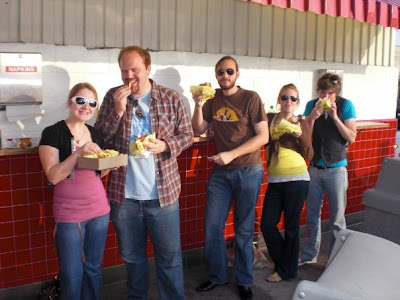 As Hitchcocktober comes to an end this Halloween, it's only appropriate to take a nostalgic look back at Hitch's most frightening film, Psycho. If you're one of the few stragglers who hasn't seen this wonderful film, I warn you that SPOILERS FOLLOW.
As Hitchcocktober comes to an end this Halloween, it's only appropriate to take a nostalgic look back at Hitch's most frightening film, Psycho. If you're one of the few stragglers who hasn't seen this wonderful film, I warn you that SPOILERS FOLLOW. Now then, critical evaluation of Psycho is, at this point, a fruitless venture. So much has been said, written about, and filmed concerning Hitchcock's most recognizable and popular work that to revisit it in that capacity would resemble nothing so much as a parrot ineffectually reciting half-remembered lines from an AFI broadcast.
Anybody older than ten years old with any knowledge of American film history knows three things: One, life is like a box of chocolates. Two, Darth Vader is Luke's father. Three, there is a shower scene in Psycho. It ends badly.
I too knew all three when I first watched Psycho, but I knew almost nothing else about the film or its maker. I had seen The Birds (Hitchcock's other "scary" movie), which I had liked, for an old movie (remember, early in high school), but other than the shower scene and the vague notion of the Bates Motel, I didn't know what I was getting myself into. I figured it would be like most horror films I had seen. The psycho himself would pick off a crew of well-intended, if slightly over-sexual, vacationers, suffer vengeance from the plucky one smart enough to avoid knifing, and suffer his own grisly death.
Obviously, Psycho's measured, deliberate, thoughtful first half-hour threw me off. Marion chats with her boyfriend, goes to work, steals a bunch of money so that she and the boyfriend can run off. No knives, no blood, no screaming. Just a little ominous music as she drives down the road with the bag full of cash. A cop pulls her over, blah, blah, blah, she buys a new car, blah, blah, blah… and THERE! YES! The rainy night forces her off the road at the Bates Motel. Here it comes! Sliced to ribbons! Norman Bates, the madman himself, there he is! Wait, what? Taxidermy, he's talking about taxidermy? Oh, ok, I get it. Dead things. Building a little atmosphere. I like it! Dinnertime is over, hide the money, and FINALLY! The shower scene! Wait, it's only been half an hour. Isn't this woman the star of the movie? What is going on here?
Evidently, audiences in 1960 went through a version of this same line of thought when they saw the movie, too. Now, their expectations might not have been so molded as mine (horror wasn't exactly a genre then), but the hype surrounding the film and the early death of its biggest star certainly messed with them. Now what? they must have thought. I know it's what I thought.
But as the shower scene comes to an end, Hitchcock hits us with an image so ghastly that it's still the first thing I see when I hear the word "psycho:" Janet Leigh's open-mouthed, blank-eyed stare as the camera pulls back from her very dead face. I don't know how many seconds the camera is on her there, but it feels like thirty. It was that shot that gave me my first real feelings of admiration for Alfred Hitchcock. It took serious guts to pull a string so hard as a storyteller that it disorients the audience, but that's what Hitchcock did. He knew when he made the film that at that moment every person in the theater would feel totally vulnerable, not only because they had witnessed the brutal murder of a totally vulnerable woman, but also because none of them could possibly know what was coming next. Alfred Hitchcock, better than any filmmaker before or since, expertly cultivated that feeling from his audiences: anxiousness, uncertainty, and suspense were the fruits of his harvest. Never was the harvest more bountiful than in Psycho.
And Hitch had planned for all of it. He famously ordered theaters not to admit anyone arriving after the film started because he wanted every moment to have its particularly designed effect upon the audience. He would have been pleased, I'm sure, by my initial viewing. The bewildered look on my face would have sent him into a gleeful fit of laughter and satisfaction.
Vladimir Nabokov said that fiction is successful when a story's resolution feels both unexpected and inevitable. Whenever I watch a Hitchcock film, I'm reminded of that thought and am once again blown away by how effectively he managed to execute, time after time, stories that met both standards.
A few years ago, the Kentucky Theater screened Psycho during their Summer Movie Series, and I went, hoping in part to recapture those initial sensations and see those masterful shots and scenes writ large on the big screen. The showing was an unmitigated disaster. A large crowd had turned out, and, exercising the sort of participatory spirit usually reserved for screenings of The Rocky Horror Picture Show, they proceeded to talk and giggle throughout the film's first half-hour.
Then Janet Leigh turned the shower on. The shadow cast upon the curtain. The look of dawning comprehension. The strings. The scream. The 90-odd cuts. The tearing curtain. The drain. The eye. The face, frozen and horrible. And silence. A few hundred people held their breath. And sure, the jerks went back to talking and laughing at inappropriate moments eventually, but for those few seconds, Hitchcock veterans and novices alike were putty in Sir Alfred's hands.
Do yourself a favor with the little time you have left in Hitchcocktober, and let the master tell you a story.


















